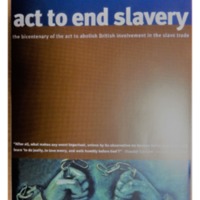
Set All Free Gloucestershire
The Gloucestershire Set All Free initiative was organised by Churches Together in Gloucester and other organisations to mark the bicentenary. An Events Guide set out some of the events, lectures, film screenings, music festivals and exhibitions taking place in Gloucestershire to remember the horrors of transatlantic slavery, while also making clear the imperative to take action to end modern forms of slavery. There were bicentenary related activities at Gloucester City Museum and Art Gallery and Cheltenham Art Gallery and Museum. There were also a number of events at Gloucester Cathedral and local churches, including St Mary's in Wotton-under-Edge. Two exhibitions focused on contemporary slavery were organised by the Anti-Slavery International League. The Guide also includes details of various festivals with a focus on the bicentenary, including the 1 World Festival Freedom 07, the Gloucester International Rhythm and Blues Festival and Cheltenham Music and Literature Festivals.
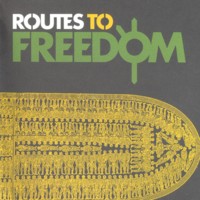
Routes to Freedom
The 'Routes to Freedom' season of events took place throughout Autumn 2007 at The Drum, an intercultural arts venue in Birmingham. The programme explored the struggle for social justice and equality in relation to African, Asian and Caribbean communities, and marked two key historical events and their impact: the bicentenary of the Abolition of the Slave Trade Act and the 60th anniversary of the partition of the Indian subcontinent. The programme was made up of theatre productions, touring exhibitions, film screenings, readings, dance performances and special events, including 'Coolies of the Caribbean' and a conference about Olaudah Equiano.
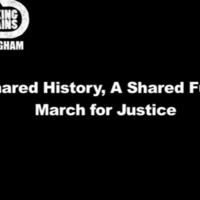
A Shared History, A Shared Future
A Shared History, A Shared Future was a series of projects led by Birmingham Libraries to engage with different communities within Birmingham. The project as a whole identified archival materials, local historical documents and music with an emphasis on the diverse multicultural nature of historical and modern indentured slavery, and how it relates to everyday lives in Birmingham. Over 1000 participants from schools and community groups took part in over 150 workshops to create stories, artwork, banners, protests, games, films, dances, drama and performances. A resource pack, the liberty box, was produced to encourage community groups, youth groups and others to explore the issues of slavery. In August 2007, the project organised the March for Justice in Birmingham city centre, a recreation of the Quaker and philanthropist Joseph Sturge's march against slavery in August 1838. The day included an anti-slavery fashion show, a limbo performance, storytelling, African drumming, and a Slavery Question Time Special hosted by an actor representing Olaudah Equiano.
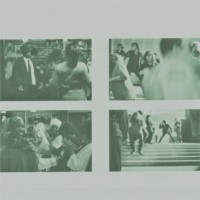
Down at the Bamboo Club: Film, Participation and Re-enactment
Down at the Bamboo Club was organised by Picture This, an artists' film and video commissioning agency in Bristol. The project was an exhibition of artists' video exploring Bristol's cultural histories and ideas of legacy. Contemporary artists worked with community groups to develop films and events that used the device of re-enactment to explore subjects such as community relations, identity, the legacy of slave trading in the city and histories of division and solidarity. One such film was 'Bamboo Memories' by Barby Asante. The Bamboo Club was a legendary Bristol nightclub in the 1960's and 1970's which holds great significance for older generations in the city as a place where first groups of African-Caribbeans socialised with white Bristolians.
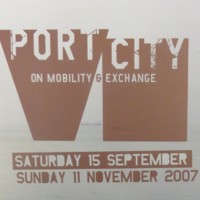
Port City: On Exchange and Mobility
Port City was a large-scale exhibition featuring over 40 international artists and addressing issues of migration, trade and contemporary slavery. Set in the arts centre and gallery Arnolfini, it was accompanied by a programme of art, music, film, literature and educational activities. Coinciding with the bicentenary year, several works explored Bristol's histories of trade, as well as a contemporary port. For Seeds of Change, Brazilian artist Maria Thereza Alves researched sites around the Floating Harbour where ballast would have been off-loaded. The ballast seeds discovered were germinated by local groups so as to make a garden of ‘living history’, reflecting the different routes travelled by Bristol merchants. Other highlights included a model of a 'global village' made from sugar by Meschac Gaba and kaleidoscopes showing contemporary scenes from the triangle of the transatlantic slave trade by Mary Evans.
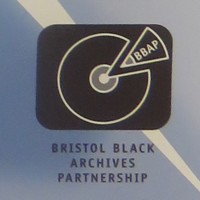
Bristol Black Archives Partnership
The Bristol Black Archives Partnership (BBAP) was set up to collect, protect and make available the heritage of Bristol's local black history. The partnership involved communities, heritage organisations and academic organisations coming together to collect and make accessible the archives - films, photographs, documents and objects - that reflected the experience and contribution of black people in Bristol. BBAP aimed to provide learning resources for a better understanding of Bristol's multicultural history: the 'Me, We, Making History' calendars celebrated local black achievers; 'My Legacy Journal' was made available for African-Caribbean people to record their own family identity, history and stories. A Black Bristolians Teaching Pack was produced, alongside a travelling exhibition based on the project's research entitled 'The Black Presence in Bristol - 16th Century to the Present Day'.
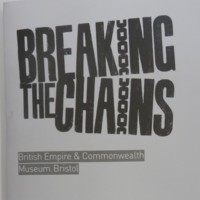
Breaking the Chains
Breaking the Chains opened at the British Empire and Commonwealth Museum to coincide with the bicentenary, and told the story of the British transatlantic slave trade and its abolition. Developed in partnership with Bristol City Council's Museums, Galleries and Archives' Service, the exhibition used artefacts, film and testimony to challenge perceptions about Britain's involvement in the slave trade and its legacy today. It featured a multimedia gallery of digital memories and feelings on the contemporary legacies of the slave trade; interactive sound stations to see and hear personal testimonies and the power of black music; and the ‘Me deya’ gallery, led by Firstborn Creatives, a collection of work from artists and communities who wished to share their creative pieces about the legacies of the slave trade. Associated events included African music for children, community dance events and public debates.
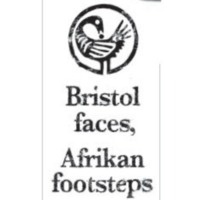
The Adisa Project: Bristol faces, Afrikan footsteps
The Adisa project gave a group of 20 young people of African and African Caribbean heritage the chance to investigate their roots both in Bristol and Africa. The group researched the history and legacies of Bristol's involvement in the trade in enslaved Africans, and its impact on one African country: Ghana. This was a community partnership project in collaboration with the Bread Youth Project, Full Circle Youth and Family and the Mill Youth Centre. The group opened their own exhibition, 'Afrikan Footsteps' at the City Museum and Art Gallery, after a two-week research trip to Ghana to learn about the country's history and culture. The exhibition included short films made by the participants; a Quotes Wall, taken from young people’s interviews with members of their local community; a wall of their personal heroes; a photographic exhibition of their trip; and 'Ma’afa Journey', a film recording their personal reactions to places visited in Ghana.
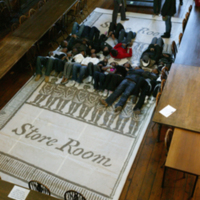
Changing Perspectives
Changing Perspectives was a community-based initiative based around the experiences of twenty-five African and Caribbean families from the North-East, to explore how their life in the UK contrasts with the lives of their ancestors. The project created a multimedia archive of cultural responses to celebrate the heritage of these families. This included oral testimonies, creative writing, photography, digital storytelling and art, emerging from a variety of community-led workshops. A series of workshops were held at Durham University Library, Archives and Special Collections (pictured), including a session aimed at children and young people, which focused on the experiences of children in the slave trade via extracts from the autobiography of Olaudah Equiano. Project outputs included a book, an interactive website, an exhibition of words and pictures of the community, an oral testimony collection, and series of documentary films. A key aim of the project was to promote community cohesion and develop cross cultural awareness and understanding.
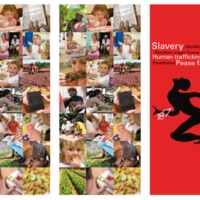
Slavery Here!
Slavery here! was a project hosted by museums across the Tees Valley led by Preston Hall Museum. It featured an interactive exhibition to explore the story of the Tees Valley’s connections with slavery. For example, the town of Stockton-on-Tees had its own Sugar House, a refinery that processed sugar from the Caribbean. The exhibition also looked at the work of local abolitionist campaigners Dr Robert Jackson and Elizabeth Pease, and the impact of contemporary slavery on today's society. Alongside the exhibition at Preston Hall Museum, other special events included workshops on African drumming and culture, object handling, and introductions to Fair Trade products. The project also produced a commemorative quilt (in collaboration with Newtown Community) and a film, ‘Manacles and Money’.
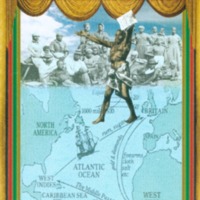
Leeds Bicentenary Transformation Project
This collaborative community initiative celebrated African and Caribbean culture in Leeds, with a focus on commemorating the Abolition Act by 'highlighting African achievement, liberation and aspirations'. New exhibitions, publications and resources were produced and over 100 bicentenary events organised under different themes: Education and Museums; Arts and Carnival Culture; Churches and Abolition; Legacy; Black History and Community Development; Media and Communications. Highlights included the photographic exhibition and pamphlet 'From Abolition to Commonwealth', which remembered indentured labour in Africa and the Caribbean after 1807, and the 40th anniversary of Leeds West Indian Carnival, with themes that highlighted heritage, liberation, respect and freedom. Project outputs included an education pack, black history classes, concerts, church services, lectures and performances.
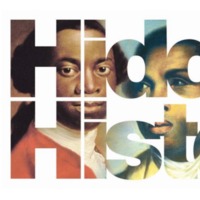
Hertfordshire's Hidden Histories
This partnership project, led by Hertfordshire Archives, investigated the links between Hertfordshire people, the slave trade and abolition through stories from original archival documents. Project outcomes included creative workshops, a booklist, a DVD documentary, a heritage trail booklet, and collaboration with the project for the restoration of the Thomas Clarkson monument in Thundridge. The monument was erected in 1879 to mark his involvement in the campaign to abolish slavery. The ceremony to re-dedicate the monument in November 2007 involved pupils from Thundridge Primary School performing a dance that they had developed with arts-led charity Theatre Is….
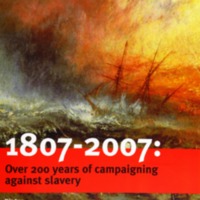
Anti-Slavery International, 2007
The world's oldest human rights organisation, Anti-Slavery International, led several initiatives in response to the bicentenary. The Fight for Freedom 1807-2007 Campaign, launched in 2005, called for measures to address the continuing legacies of the slave trade. The publication '1807-2007: Over 200 years of campaigning against slavery' looked back at the work of Anti-Slavery International and its predecessor organisations. The Spotlight on Slavery series of exhibitions and events included debates, lectures, film screenings and photography exhibitions. Anti-Slavery International also collaborated with a number of other organisations and projects in 2007, including Rendezvous of Victory and Set All Free, and contributed exhibition material to various exhibitions around the UK, including the Remembering Slavery exhibition at the Discovery Museum in Newcastle.